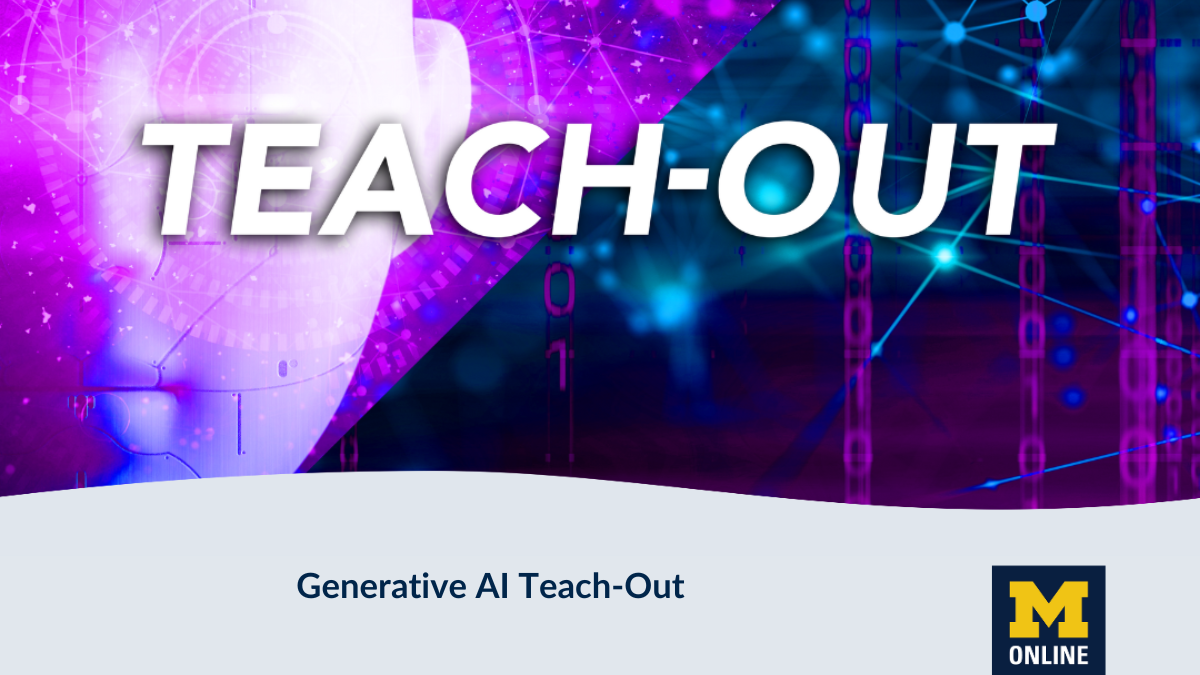
Generative AI: Learn How It’s Built, How it Will Impact Jobs and Daily Life in Teach-Out
Explore how generative AI works and the policies being created to prevent the misuse of these tools around the world
When ChatGPT debuted in 2022, it was most people’s first introduction to generative AI and large language models. While ChatGPT serves as a user-friendly entry point for people into this technology, its implications for society, culture, the job market, and productivity are vast, as are the potential dangers it presents in the form of copyright, creative works, deep fakes, and scamming vulnerable populations.
The “Generative AI Teach-Out” from the Center for Academic Innovation brings together policy and academic experts from the University of Michigan to explore the quickly evolving world of artificial intelligence and generative AI tools, ethical considerations, implications of authorship, and how AI tools could be utilized and regulated in the future.
U-M experts in communications technology, the economy, artificial intelligence, natural language processing, healthcare delivery, architecture, and law provide Teach-Out participants a background in generative AI and LLMs, how humans are engaging with AI right now, the ethical and legal implications of the emerging technology, and its potential impact on society, economics and education.
In March, the center held the “ChatGPT Teach-Out” focused on the chatbot developed by OpenAI, and it was one of the center’s most popular interactive online events with more than 11,000 participants. The “Generative AI Teach-Out” online event expands the scope of that Teach-Out into considerations of how large language models are built and the rapidly improving pace of the technology.
There will also be an online event held on Aug. 23 with experts featured in the Teach-Out to discuss generative AI and answer questions from participants.
Generative AI is at the heart of many of the conversations taking place today in the arts, in business, and at the intersection of creativity and productivity. The Teach-Out explores this through the ongoing actors and writers strikes in Hollywood, where protection against AI is one the core demands of the respective unions. The Teach-Out also details how the LLMs are built, how they are trained, and even questions of copyright protections against where the generative AI tools are pulling data from and who owns the final results of any generative AI piece of writing, art, or video product.
There are also questions of the potential positive impacts of generative AI on people’s daily lives, from helping schedule meetings and trips, or crawling expansive texts or sources of information to provide helpful, personalized summaries.
Governing and regulation bodies around the world are also reacting to generative AI through legislation and policy. The Teach-Out features a clip from 60 Minutes where Google CEO Sundar Pichai talks about the need for global AI regulations, a proposed AI Bill of Rights released by the White House in the U.S., and emerging policies in the European Union and in China.
Featured Experts
Other featured experts in the Teach-Out include:
Kentaro Toyama, professor in the School of Information, researches communication technology.
Julie Hui, assistant professor in the School of Information, researches the impact of technology on access to work and employment. Hui also worked with the Center for Academic Innovation to create Lettersmith, an AI-powered writing tool that helps build writing skills and helps people more effectively communicate with clients, employers and fellow professionals.
Michael Wellman, professor of electrical engineering and computer science, researches artificial intelligence and electronic commerce.
Rada Mihalcea, professor of electrical engineering and computer science, studies natural language processing.
Cornelius A. James, MD, clinical assistant professor of internal medicine, pediatrics, and learning health sciences at the Medical School, studies machine learning and artificial intelligence in healthcare.
Jack Bernard, associate general counsel at the University of Michigan, discusses plagiarism, bias and discrimination concerns with large language models like ChatGPT.
Scott Page, professor of complexity, social science and management with the Stephen M. Ross School of Business and College of LSA, discusses potential applications for ChatGPT in business, politics and social sciences.
Joyce Chai, professor at the College of Engineering, is a member of the Michigan AI lab with research interests that include natural language processing and human-machine communication.
Matias Del Campo, associate professor at the Taubman College of Architecture and Urban Planning, is the director of the Architecture and Artificial Intelligence Laboratory.
H.V. Jagadish, professor in the College of Engineering, is the director of the Michigan Institute for Data Science.
Kurt Skifstad, executive director of the Center for Entrepreneurship, has founded several technology companies in his career and explores the intersection of artificial intelligence and business.